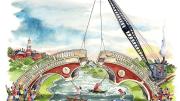1915
The University’s new professor of hygiene institutes precautionary measures in the weekly inspection of milk, butter, and cream supplies in various Harvard dining halls to forestall the “epidemics and ‘flashes’ of typhoid which have wrought havoc in other colleges….”
1925
The Massachusetts legislature passes an act to permit construction of a footbridge over the Charles River from the Cambridge side to the site of the Business School’s proposed buildings.
1935
President Conant’s proposal to eliminate Latin as an entrance requirement for A.B. candidates creates a furor.…The Faculty Council decides that knowledge of either Latin or Greek will remain a requirement for the A.B. degree.
1960
The Faculty of Arts and Sciences approves Social Studies as the second interdepartmental honors concentration for undergraduates, almost 60 years after History and Literature became the first.
1965
Chanting “Raise Cops’ Pay,” a shifting group of about 200 undergraduates stage a spring “riot” on Sunday, May 9, between 10 p.m. and 1 a.m., heading to Radcliffe twice and to Lesley College once for panty raids, largely unmolested by either Cambridge or Harvard police. The outbreak apparently forestalls a planned sit-in at Lamont by a Radcliffe group, WILL (Women to Invade Lamont Library).
Harvard asks the Cambridge City Council for permission to spend $2 million to depress Cambridge Street and build a pedestrian mall over it from Littauer Center and Phillips Brooks House to the fire station.
1985
A small protest fails to keep South Africa’s consul general from a Harvard Conservative Club luncheon at Lowell House, and the crowd grows to nearly 200; some block a Harvard police car, others scuffle with a police escort. (The consul leaves via steam tunnel.) The incident prompts the reconvening of the Committee on Rights and Responsibilities (set up in 1969) for the first time in seven years.
2000
A University committee recommends extending job training and health-insurance benefits to almost all University employees, including casual workers and those employed through subcontractors. Hundreds of students, meanwhile, turn out to hear Matt Damon ’92 endorse the living-wage campaign being sponsored by the Progressive Student Labor Movement.








